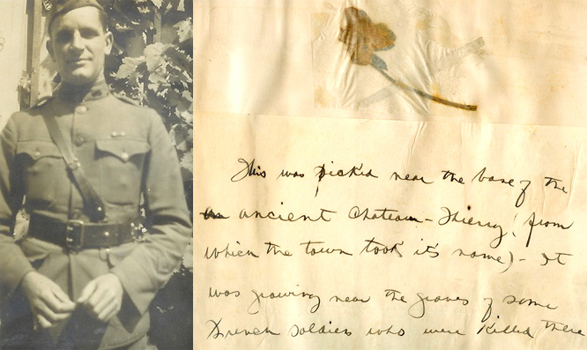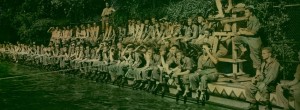
John Pleasant Potter, and a flower he picked near French soldiers’ graves at Chateau-Thierry
A recent biography calls him “the trigger”: 19-year-old south Slav nationalist Gavrilo Princip, who, in Sarajevo on June 28, 1914, fired his pistol at Archduke Franz Ferdinand, heir to the Austro-Hungarian Empire, and (though he claimed it was unintentional) at the Archduke’s wife Sophie. Both died almost instantly. A month later, Austria-Hungary declared war on Serbia, and the rest of Europe, for various geo-political reasons, followed them into the abyss of World War I.
Here in Kentucky, Bowling Green lawyer Clarence McElroy learned of the widening conflict from clients living abroad. In letters from Surrey, England, Margaret Whitehead Robertson’s reactions ranged from uncertainty to defiance to resignation. Having recently sold a house, she asked McElroy in August 1914 to invest the proceeds at home rather than overseas, “as no one is sure about the war. Of course, we all hope England & her allies will win but the war may last 2 or 3 years.” A few weeks later: “This war is such a dreadful calamity, and everybody I know thinks Kaiser Wilhelm II will have a great deal to answer for, for bringing about a European war. The Allies are doing splendidly, and we are all disgusted with German atrocities and their terrible military system, which wants to rule the world.”
By October, Margaret was recovering from the initial upheaval. Vacationing in Eastbourne with her sister Charlotte, who was knitting socks for the soldiers, she noted that the area was enjoying a prosperous autumn “to make up for the bad summer season when people were afraid to come to the seaside at the beginning of the war.” But after Christmas, rumor had again unsettled her. She wanted to escape wet and snowy England for Switzerland, but had heard that if Italy entered the war, the food supply to Switzerland might be cut off. “These are horrible times,” she observed, “and I do wish the war were over.”
The Manuscripts & Folklife Archives section of WKU’s Special Collections Library holds many other World War I-era collections, especially relating to the period after the United States entered the war in 1917. For example: a scrapbook chronicling the military service of Bowling Green’s John Pleasant Potter, lovingly kept by his mother; letters from Victor Strahm, the son of WKU music director Franz Strahm and a much-decorated air ace; letters of Simpson County native George DeWitt Harris, who died of battle wounds suffered in France; as well as patriotic speeches, poems and postcards. For other collections about World War I, search TopSCHOLAR and KenCat.
 ERC part-time library assistant Robbie VanValin has decided to retire after nearly 7 years with the ERC, where she has been a friendly face and a welcoming voice to ERC patrons. We will miss her very much—her willingness to help, her sweet personality, and her genuine interest and engagement with our patrons and student workers. We would like to wish Robbie all the very best for her retirement.
ERC part-time library assistant Robbie VanValin has decided to retire after nearly 7 years with the ERC, where she has been a friendly face and a welcoming voice to ERC patrons. We will miss her very much—her willingness to help, her sweet personality, and her genuine interest and engagement with our patrons and student workers. We would like to wish Robbie all the very best for her retirement.




